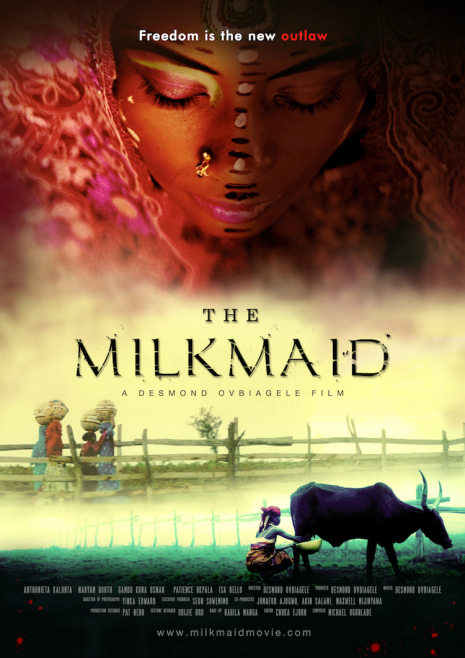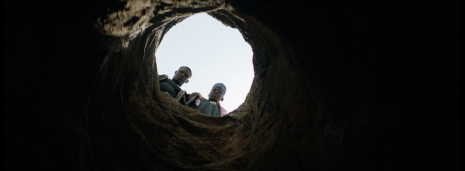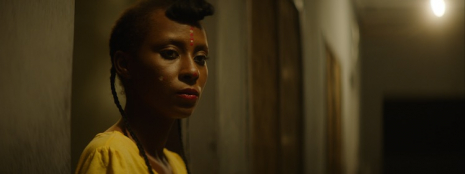
Sunday morning, flicking through news channels I chanced on a Nigerian breakfast show that held my attention between mouthfuls of cereal. Four women around a table were discussing a new movie called The Milkmaid. Clips were played as one woman said she hoped the movie would get the chance to be screened at Cannes, and have the chance of being seen at the Toronto Film Festival. This was not just an ordinary movie—The Milkmaid was one of the best movies to ever come out of Nigeria.
Every so often there comes along a movie that will change everything. Parasite did it at this year Academy Awards and I’m laying money that The Milkmaid will win awards and do the same at next year’s Oscars. This movie is a game changer—a work of brilliance, a compelling harrowing tale that does what all great works of art should do: make the viewer question what is going on in the world.
It’s inspiration comes from real events. In April 2014, 276 female students were kidnapped from a school in Chibok, Borno State, Nigeria. The girls had been kidnapped by Boko Haram, an Islamist extremist terrorist organization operating out of the north-east of the country. The kidnapping brought condemnation from across the world. After some of the girls were released, the story and interest in the lives of these girls and the people tragically caught in the crossfire between terror and extremism were soon forgotten. Filmmaker Desmond Ovbiagele thought something ought to be done to highlight the psychological trauma, displacement and economic impoverishment extremism inflicts on society. He started writing a screenplay about Aisha, a Fulani milkmaid, searching for her younger sister, who approaches the religious militants responsible for their separation. Ovbiagele has crafted a powerful piece of cinema which he hopes will bring “attention to the present plight of real-life victims of militant insurgency in Nigeria (internally displaced persons, IDPs), to generate support for their economic and psychological rehabilitation and social re-integration.” His film offers a discourse on the very real threats posed by extremism.
Shot over three months in Nigeria, The Milkmaid stars Anthonieta Kalunta in her film debut as Aisha, with Maryam Booth as her sister Zainab, and Gambo Usman Kona as Dangana. Unlike most movies pumped out by Hollywood or Marvel or Disney or whoever, The Milkmaid is an important, complex film, a substantial work of art that addresses issues pertinent to all of our lives. What it needs now is to be seen by as many people as possible.
I contacted writer and director Desmond Ovbiagele to find out more about him and the making of his movie.
How did you start making The Milkmaid?
Desmond Ovbiagele: I completed and released my first feature film in 2014, a locally set (in Nigeria) crime drama. Spent the next three years recovering from that interesting experience. Then early 2017, felt I was ready to get back into the fray, and commenced writing the script for what turned out to be my next feature, The Milkmaid.
What was your inspiration for the film?
DO: Creatively, I find myself drawn to themes that are of contemporary social relevance. Perhaps it’s because I believe that the medium of film is imbued with such amazing power, and the process of realizing a story can be so incredibly daunting and challenging; therefore one needs to tackle issues that justify all the palaver. And clearly the prevailing insurgency and general insecurity in my immediate environment was a natural candidate for attention. Following the much-publicized outcry and placard-carrying by presumably well-meaning international celebrities over the abduction of the Chibok girls in 2014, it was rather disheartening to watch the widespread moral indignation steadily (and surprisingly quickly) vaporize to near-total silence (both locally and internationally), even when the atrocities were clearly still being committed, albeit largely to victims from a different demographic, perhaps. And given that literally millions of survivors are currently wasting away in the makeshift camps for internally displaced people (IDPs) that dot the country, their lives at a total dead-end, I guess I felt a burden to use the craft and my privileged position to speak on behalf of those who lack the facility to make themselves heard.

How did you come into filmmaking? What is your background?
DO: Came from a career in financial services that was materially rewarding but clearly left a gap in the personal fulfilment department. Took me several years to identify how to fill that gap; turned out to be writing and directing. A bit surprising, as I had done practically nothing in either area all my life, although a rapacious reader of novels in my childhood, to be fair.
How did you become involved in filmmaking?
DO: Basically started out as a screenwriter; wrote and submitted several scripts (frequently with international settings) that went absolutely nowhere. Felt I needed to pursue more control of my destiny in order to break through, so accordingly refocused my attention on issues closer to home (literally), whilst simultaneously foraying into producing and directing.
Can you tell me about the casting for The Milkmaid?
DO: The plan from the outset was always to render the dialogue in the prevailing language of the theater of conflict (for authenticity) which is Hausa, and to a lesser extent, Fulfulde (the principal characters are of Fulani extraction). This naturally ruled out a large swathe of the most popular actors in the local film industry (a.k.a. Nollywood) who are predominantly English-speaking, and following a couple of auditions, the cast was largely drawn from the tiny film community in Taraba State in northeast Nigeria where we shot the film. In fact, for one of the lead actresses, this was her first performance in film, short or feature.

What was it like filming? Were there any difficulties?
DO: Difficulties aplenty on multiple fronts. I actually don’t speak Hausa myself, so directing the actors (several of whose English was severely limited) under the typical time pressures was an exercise in patience and endurance notwithstanding the presence of translators. And for aesthetic reasons, we shot a number of scenes on the Mambilla Plateau which features some of the most beautiful scenery in the country, but as the highest point geographically in Nigeria, is also considerably difficult to access, particularly with heavy equipment trucks. To put it in context, a trip just from the Taraba State capital in Jalingo to Mambilla (also in Taraba) takes seven hours, much of that time negotiating up the mountain. And the trucks were coming all the way from Lagos in the southwest, on the opposite side of the country. So additional challenges were encountered when transporting our production materials through southeast Nigeria enroute to location; essentially our crew were literally almost lynched by locals there who were erroneously informed that the our costumes and props were evidence that they were the terrorists who had coincidentally attacked that same community just a few days prior. We lost an entire week of shooting whilst battling to resolve that particular imbroglio. So, yes, a few difficulties.

Director and writer Desmond Ovbiagele.
What has been the response to your film?
DO: We’ve held just a couple of private screenings thus far but are very gratified at the feedback; people definitely seem to connect with the story, cinematography and performances, and it certainly helps that it is obviously a very topical issue (insecurity)
How can we get your film to Cannes and Toronto and onto the American market?
DO: Clearly very lofty platforms with a formidable number of films all aspiring to get in, so we would really appreciate as much buzz as can be generated anywhere possible to improve our prospects for
consideration.
Check here to find out how you can help get The Milkmaid to a cinema near you.